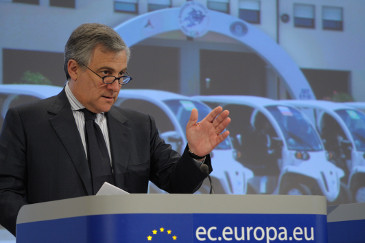Industry and Entrepreneurship
Efficient cars
Fostering Europe’s leadership in automotive manufacturing

Cars triggered the industrial revolution of the last century making individual, fast mobility available virtually to all. Now they can bring us to a new stage of the industrial era where mobility will become even easier and more environment-friendly. The European Commission is working to achieve this ambitious target.
Making the sector greener is part of a comprehensive strategy to tackle the ongoing crisis of European carmakers. The automotive sector is a major employer. Over 12 million jobs directly and indirectly depend on it. There are about 180 vehicle plants across Europe with an overall turnover of more than €700 billion.
However, the economic crisis and the maturation of the European market are hitting the industry heavily. Production and sales in Europe have declined steadily since 2008. As a consequence, factories are shut down and workers are made redundant. In many cases car makers remain profitable only because of sales outside Europe.
"The world will face a formidable increase in the demand for cars in the coming decades, which makes it essential to create more efficient or zero-emission models. The EU Commission strategy is aimed at improving the efficiency of the currently used "warm" engines, which will remain the more widespread at least for the next two decades; while at the same time getting prepared for the cars of the future, those with lower emission emitting "cold" engines and even zero-emission engines."
The Commission response to this systemic crisis – with its implications for a number of connected sectors, including steel, chemical and textile - is threefold.
First, we are trying to revamp the European economy, as this will help renew demand for motor vehicles in Europe. Increased sales should limit the closure of factories. While some closures are inevitable, the Commission has put in place a number of procedures and funds to help redundant workers get proper retraining to re-access the job market as quickly as possible.
Second, we are supporting the industry to move to green products, which we believe will better meet the demand of more environmentally conscious consumers in Europe, while at the same time reducing the harm to our planet.
This is not wishful thinking. We expect global registrations of electric vehicles to increase significantly, and green cars to have a 7% share of the EU car market by 2020. To facilitate this change, the Commission is investing in research in clean cars, while the industry is also doing its part to improve fuel efficiency of conventional engines and to create affordable and dependable electric vehicles.
The building of a proper urban infrastructure for electric car recharging is underway and the Commission is pushing for the adoption of common standards across EU countries.
Finally, we are engaged in helping our carmakers access foreign markets, in which the demand for cars is expected to double by 2020. The automotive sector is a prominent subject of discussion in all trade negotiations with international partners.

